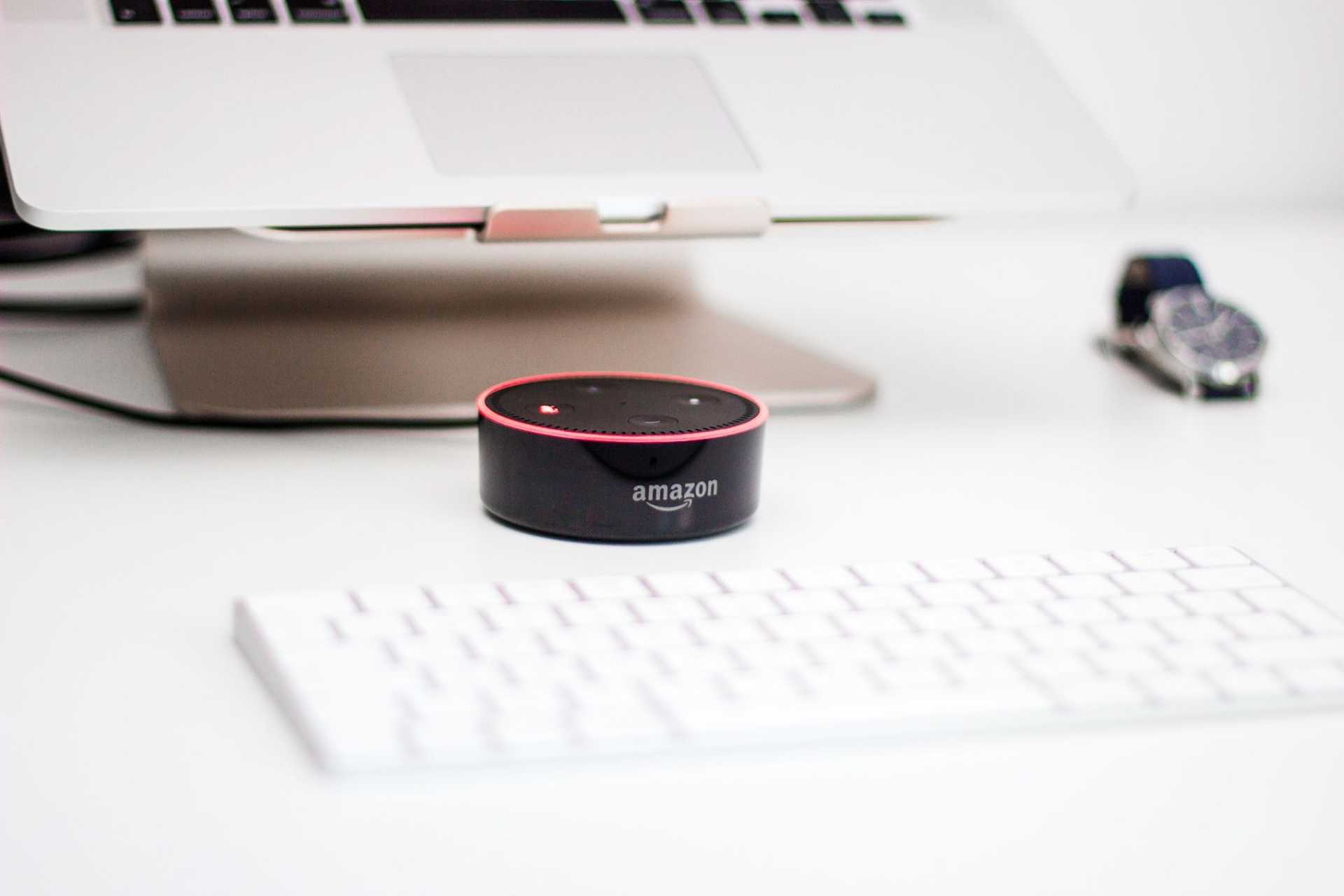In Episode 2 of ‘Industry Spotlight’, the Flaunt Digital team discuss the rise in popularity of voice search and what the future of search may look like. Subscribe to our YouTube channel for all the latest episodes.
See below for a full video transcription.
VIDEO TRANSCRIPTION
Lee: There was an article highlighted on Search Engine Land, based on a survey where people are becoming less inhibited about how they’re using voice search in public. So whereas probably three years ago, someone talking to their phone would look a bit odd. You get that a lot these days. The rise in voice apps on phones is becoming more prominent, and things like Alexa, Google Home have obviously paved the way. I think from a search perspective, Google have been moving towards a more conversational algorithm in terms of capitalizing on long-tail keywords.
So I think that’s something that’s been happening for a while. I think Amazon releasing Alexa and the Echo has accelerated everyone’s sort of race to get there and brought it into the public eye. I think the adoption of that specific product, although Amazon is a massive platform, they could probably sell you a plastic bag with Amazon branding on it and people would buy it. I think that has really heated it up. You’ve got everybody trying to jump in there. Samsung have got Bixby, Google, obviously, voice search has been built in for a while. You’ve got Amazon with Alexa. Then you’ve got…
Jamie: Well, obviously Siri.
Lee: Siri, obviously. Siri is probably the first one that got created.
Chris: Cortana as well.
Lee: Yeah. Microsoft even had a go at it. Are they still supporting that?
Jamie: Well, it’s on Windows. Yeah. But Window’s phones are defunct now. So it’s just desktop-based voice search through Cortana. I’m not sure how much resource they’re putting into developing that further, but they did shove a lot into it. But I think that was mainly down to the phone. I imagine they’re still supporting it.
Lee: Yeah. I think, in my opinion, we’ll see a similar trend in voice search to the mobile desktop traffic slide. So whereas, maybe, eight years ago, I would say probably, what, 90% desktop searches. Now it’s the other way around almost. What are we talking? Like, 85% mobile there or thereabouts.
Chris: It’s a bit skewed to mobile now.
Lee: I think in another five years, voice will have been in the public eye for seven, eight years. I think we’ll start to see that becoming a more regular… It might not be an everyday usage… I don’t think you’re ever going to really walk around and speak to your phone as opposed to typing on your phone. But things like in-home usage, things like that, I think are just going to explode. I mean, the amount of Echo devices that Amazon have sold is…it kind of indicates the way it’s going.
Chris: I think that’s it. I think that’s paved the way. And I think why we’re seeing an increase, generally, in people using search commands is because of like the Echo and the Home and stuff being launched, people feel more comfortable in a public situation to do it because people are aware of what the other people are doing. Whereas, you might just look like a crazy person walking down the street asking Cortana or whatever to do something. Like you say, a lot of people have an Echo or a Home in their house now, so they’re used to hearing those day-to-day commands. I think the stumbling block, at the minute, and where a lot of people probably still don’t use it to the extent that they will a few years down the line is the frustration of the accuracy.
They are getting more accurate. They’ve got better over the last three years, I would say. But still, I think people prefer to either perform a search through a browser or something like that if they’re looking for something, rather than a voice command because they know that it’s… They don’t want to have to do it twice. Although, if you pin in a wrong character, that’s equally as frustrating. But people are more adept at doing that than they are the voice function. It’s learning the technology that’s powering the commands as well and the search feature because… I mean, how many times have you…given your phone a command or your Alexa and there’s not been a response. It’s frustrating. So you just resort back to what is the easiest thing really. And as that technology develops, I think it’ll…people will start seeing more of it, definitely.
Lee: That’s definitely one of the keys. I think when performing a voice search saves you more time than typing it, that will become when it starts really rocketing. I think it’s all about the time. It takes you longer to type something into your phone as it would to speak to something, but the accuracy is the key there.
Jamie: Yeah. I disagree on quite a bit. So I’ll chuck my two pence in. I think voice search is obviously going to increase because it’s starting from pretty much scratch. So it’s got to go somewhere and it’s only going to go up. But it depends what you’re comparing it to. So if you’re comparing it to text-based search… So if you think about applications of that, let’s say you’re in the workplace, for example. If you do a voice search, you’re going to want to read the results. So this is different to an Echo where it’s going to be literally read back to you by a robot or whatever.
Whereas, if you’re speaking into a computer or a phone, you’re going to be reading it back on screen. You’re not going to get it spoken back to you, 9 times out of 10 I imagine. So application there, I think is stunted quite a bit because let’s say you’re doing some research at work. You’re not going to want it dictated back to you. You’re going to want to read it. So you’ve obviously got a screen in front of you anyway. If it’s on a phone, it’s got a keyboard on it. If it’s not a phone, you’ve got a keyboard in front of you anyway.
But I think… I do agree with a lot of your points around the hardware. I think software and hardware advances have come on tons and tons and tons in the last five years when it comes to noise cancelling microphones and just speaker technology coming down in price. And then you look at… You’ve got someone like Amazon pushing these devices, selling them for dirt cheap. Distribution networks obviously are spot on. They’re putting them to the top of the search. If you type in “speaker” and Amazon Echo is at the top, whether you like it or not. So that kind of stuff is really pushing it on people. And while people continue to use it and they continue to invest in it… I know Amazon are absolutely smashing their resource with Alexa. I don’t know how many… There’s something like 100,000 people working on it, which is insane. It’s bigger than a lot of tech companies as a whole.
And Amazon really need to leverage that because Amazon have got…if we’re talking about search specifically with voice, Amazon have got a hold on that now. They’ve got the hardware. They’ve got Google, really, by the kahunas and they need to chuck their weight around a bit there because they’ve got everyone. I don’t know what the stats are but Alexa voice assistant usage must outweigh Google, Apple, Microsoft and all the other players all put together by, I don’t know, 10 times, something daft. So I feel they really need to chuck their weight around there. I don’t know what, again, stats wise but…
Lee: I think the key is that Amazon launched Echo two years ago. Although Siri came first on phones, like we’ve just said there, the premise of walking around and talking to your phone as opposed to typing it in two years ago weren’t going to work. So the way in which Amazon has put it across by creating this device that makes it more comfortable, and you’re in an environment where you’re more comfortable naturally because you’re in your home, I think the place where brands, businesses, and marketers are going to have to be aware is that people’s way of searching is going to change. Because, going back to the original point of people becoming less inhibited about how they search, it’s going to change people’s… They’re going to start searching for longer tail, conversational-based keywords.
Chris: It’s going to be longer tail keywords.
Lee: And I think you need to be aware of that so that you’re getting that context in your content on your site.
Chris: I think they’ll have to be some big updates, just from a search perspective anyway and like the search engine results, I don’t know what’s going to happen to PPC really.
Obviously, at the minute for most advertisers, 80% of the account will be short tail and broad keywords that trigger longer tailed queries. So what’s going to happen to that is there’s going to be more of this automation that we’re talking about, more dynamic ads. Like we’ve got DSAs at the minute. Is your full account going to be run on dynamic searches based on your website content picking up those terms? It could mean that your ads are more accurately targeted. Or is it going to be the other way around? Is it going to be that there’s more inaccuracy and more irrelevant ads? Because it’s controlled at the minute. You, through paid, you basically control the keyword that somebody searches. That’s the easiest way to do it.
Lee: Going way, way long-term, I think from an SEO and a PPC perspective, we could see them starting to align in terms of…you create a valuable site with good content, good user experience, you get it right from a development point of view, you get your site speed right, you get your mobile site spot on, the content that you’re putting out is good, it’s relevant to what people are searching for. You tie that then back to your paid stuff; the better quality your site is and your content, Google will be able to interpret that and understand that. And I think that could potentially tie into quality score.
So the higher quality your organic presence is and your site and the content and the user experience, based on however many signals they dream up, will then affect how present you are from a paid perspective. So it might not be about how you structure your account. It might be about how relevant your actual product and your content is.
Chris: And your user experience. I think that’s a good point. And it’s interesting you should mention like quality score as a metric. If you did shift to that, then there would be no keywords to base a quality score on. So the whole system would end up changing. If that’s the case, you probably wouldn’t have one. You’d probably have an experience score or a UX score or something like that. But I imagine it would have other implications for…put more emphasis on, like you say, site speed and the content that’s there, how well targeted that is.
But we’re almost halfway there, if you think about it. Dynamic campaigns do sort of do that for you, but the inaccuracies that come along with that, you have to be so careful for that. And it’s only really experienced advertisers that can use them properly. So I think we’ve got to be careful with that as well. But no doubt, Google will launch some product down the line that caters for that.
Lee: Well, they’re never going to get rid of PPC. I don’t think that’s going to be a scenario.
Jamie: I think this article is a bit weird, actually, just looking at the headline again, the “Search Engine Land” one. It’s talking about using voice search in public. Now, if we’re on about public, we’re ruling out Echo, obviously. That’s not a public device. So we’re talking about phones here, aren’t we? And if you’re dictating your voice into a phone, you’re not getting dictated back to like you are with the Amazon Echo. So we can sort of rule out that use case. And when you’re dictating into a device, it’s showing your results on screen. So in terms of PPC and Google ads and what have you, all it’s going to do is essentially take your voice command and transcribe that into text and then show you the same ads that you’d see anyway.
Chris: Well, it is. Yeah. But you wouldn’t search in the same way, would you? If you’re searching for something, you’re trying to find the shortest way of saying it, aren’t you?
Jamie: Have you not watched the slightly older generation type a Google query before? Like my dad, for example, would type in, “What is the cheapest kitchen for me to buy?” into Google?
Chris: Exactly. And what do we do? “Cheapest local kitchens,” or something like that. So we abbreviate it. Whereas that’s where, obviously, different keywords and match types would come into play. But how do we cater for the whole variety of people there if that’s the case? I certainly wouldn’t search for something that’s that long tail on my device.
Jamie: But people do.
Lee: A 10-year-old that’s grown up with a smartphone in 10 years will search completely differently.
Jamie: Probably so. That’s the problem there then. It’s got nothing to do with voice search. That’s something that’s going to have to be solved anyway.
Lee: But it’s voice that’s going to change the way people are using search because it’s lowering people’s inhibitions. It’s making technology more integrated in everyday life. It’s taking away the embarrassment of having to talk to a device as if it’s a person. That perception then, whether you’re typing it or not, will change the way, ultimately, that people search. It’s interesting.
Chris: I don’t think it’ll ever go completely mental. You know, we’re seeing people walk down the street commanding the devices in that way because people are a lot more private than that. I don’t think you’d ever get to that level, to be honest with you. But I imagine you’ll start to see it increase slightly when people start to get a bit more confident. Nobody wants anybody overhearing what they’re searching for while they’re on the bus to work.
Jamie: What happens if you do a product-based search query by voice into an Amazon Echo, then if you say, “What’s the cheapest kitchen for me,” or something like that, what does Amazon Echo say back to you?
Lee: It’ll probably recommend, if they haven’t got it listed on amazon.com or the country-specific version, it will say that it doesn’t know what you’re talking about. If it’s listed on Amazon, it will recommend a product…
Jamie: So will it just read you the first Google search result?
Lee: I don’t think it considers Google at all.
Chris: Well, does that sort of present an opportunity for businesses to get more on the skills side of things? So create a skill to deal with queries like this. Obviously, if you… I think localized would be a big thing for that. So if you’ve got a local kitchen company or something like that, they’ve got the skills to cope with those searches.
Lee: Domino’s have got a skill. You can order a pizza from your local Domino’s without even moving.
Jamie: I’m going to test that. I’m going to test what happens when you ask for like tradesman recommendations in Leeds on Amazon Echo and see what happens.
Lee: Going really, really broad, you’ve got to think, right, the same way that social media didn’t exist 10 years ago, people are going to be…wherever the attention is, that’s where people are. If people’s attention is on search, whatever infrastructure that sits on, voice search, that’s where people are going to be. So businesses, marketers, everybody is going to want to be present on that platform, fundamentally.
Chris: I don’t think search, the way it is today, will–this is a pretty bold statement–I don’t think it’ll ever die in that sense. I don’t think there’s any way of describing what you’re after well enough in any other way, any other method that I can see than typing it in or voice searching.
Jamie: I also think that in the future with voice, none of this work, whether or not voice search or dictating to your phone takes off as well as people say, none of the work that people like Amazon and stuff is ever going to go to waste because when you look at AR and VR, when it comes to interacting with those devices, there’s no mouse and keyboard anymore if you’ve got something covering your face. So you’re going to have to operate them somehow and it’s pretty much going to be voice.
So any of this work that goes into transcribing your voice into actions, whether it be a search query or whether it be physical, or something else, it’s all going to be really, really useful down the line in the tech world.
Lee: I think commercial VR is about 20 years away.
Jamie: As soon as you can apply VR or AR in the workplace, it’ll kick off.
Chris: Yeah. Well, that will be the next big shift. Or it could turn into… This is going even further ahead of that, and you start to get it already with suggestions in your Google Home and all that kind of thing. Based on previous activity, you might just be suggested the right products. It might know you enough based on your search history or whatever you’ve done, what interest you have and everything, it might just give you what you need in the future. Obviously, really far down the line, but it might get to you before you get to it.
Jamie: Well isn’t that the premise of those smart fridges, that it’ll look when you’ve use all your milk and not put it back in and just order you a new one? That’s sort of faded away, but as a fad, hasn’t it? But I’m sure there’s still ones on the market that do that. And then you’ve got the Amazon Dash Buttons, which essentially… You put an Amazon Dash for your toilet roll next to your toilet and every time you run out of toilet roll…press that button and there’s one there. So that’s pretty much the same thing.
Lee: They’re just selling time, aren’t they? Voice search is going to be quicker. Dash Buttons save you going online and doing it. You just push a button. Speed. Time.
Chris: Yeah. I think that’s the underlying thing, isn’t it? It’s all about speed, whichever way we want to approach it, whether it’s speech, whether typing it in, whether it’s suggested, it’s just the speed and accuracy of getting where you need to be.
Lee: Interesting conversation.
Jamie: Yeah. We sort of went off topic.





